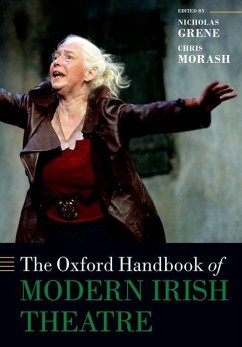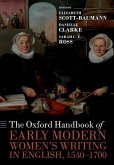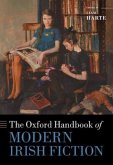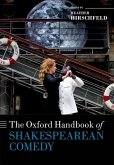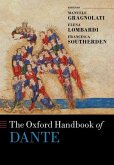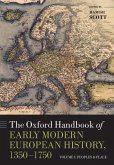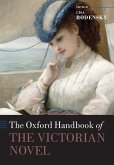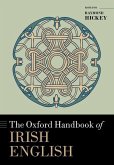The Oxford Handbook of Modern Irish Theatre
Herausgeber: Grene, Nicholas; Morash, Chris
The Oxford Handbook of Modern Irish Theatre
Herausgeber: Grene, Nicholas; Morash, Chris
- Broschiertes Buch
- Merkliste
- Auf die Merkliste
- Bewerten Bewerten
- Teilen
- Produkt teilen
- Produkterinnerung
- Produkterinnerung
The Oxford Handbook of Modern Irish Theatre provides a comprehensive guide to beginning or continuing the study of Irish theatre since the late nineteenth century.
Andere Kunden interessierten sich auch für
![The Oxford Handbook of Early Modern Women's Writing in English, 1540-1700 The Oxford Handbook of Early Modern Women's Writing in English, 1540-1700]() The Oxford Handbook of Early Modern Women's Writing in English, 1540-1700253,99 €
The Oxford Handbook of Early Modern Women's Writing in English, 1540-1700253,99 €![The Oxford Handbook of Modern Irish Fiction The Oxford Handbook of Modern Irish Fiction]() The Oxford Handbook of Modern Irish Fiction58,99 €
The Oxford Handbook of Modern Irish Fiction58,99 €![The Oxford Handbook of Shakespearean Comedy The Oxford Handbook of Shakespearean Comedy]() The Oxford Handbook of Shakespearean Comedy219,99 €
The Oxford Handbook of Shakespearean Comedy219,99 €![The Oxford Handbook of Dante The Oxford Handbook of Dante]() The Oxford Handbook of Dante251,99 €
The Oxford Handbook of Dante251,99 €![The Oxford Handbook of Early Modern European History, 1350-1750 The Oxford Handbook of Early Modern European History, 1350-1750]() The Oxford Handbook of Early Modern European History, 1350-175056,99 €
The Oxford Handbook of Early Modern European History, 1350-175056,99 €![The Oxford Handbook of the Victorian Novel The Oxford Handbook of the Victorian Novel]() The Oxford Handbook of the Victorian Novel62,99 €
The Oxford Handbook of the Victorian Novel62,99 €![The Oxford Handbook of Irish English The Oxford Handbook of Irish English]() The Oxford Handbook of Irish English200,99 €
The Oxford Handbook of Irish English200,99 €-
-
-
The Oxford Handbook of Modern Irish Theatre provides a comprehensive guide to beginning or continuing the study of Irish theatre since the late nineteenth century.
Hinweis: Dieser Artikel kann nur an eine deutsche Lieferadresse ausgeliefert werden.
Hinweis: Dieser Artikel kann nur an eine deutsche Lieferadresse ausgeliefert werden.
Produktdetails
- Produktdetails
- Oxford Handbooks
- Verlag: Oxford University Press
- Seitenzahl: 800
- Erscheinungstermin: 3. Dezember 2019
- Englisch
- Abmessung: 244mm x 168mm x 43mm
- Gewicht: 1346g
- ISBN-13: 9780198849445
- ISBN-10: 0198849443
- Artikelnr.: 57147887
- Herstellerkennzeichnung
- Libri GmbH
- Europaallee 1
- 36244 Bad Hersfeld
- gpsr@libri.de
- Oxford Handbooks
- Verlag: Oxford University Press
- Seitenzahl: 800
- Erscheinungstermin: 3. Dezember 2019
- Englisch
- Abmessung: 244mm x 168mm x 43mm
- Gewicht: 1346g
- ISBN-13: 9780198849445
- ISBN-10: 0198849443
- Artikelnr.: 57147887
- Herstellerkennzeichnung
- Libri GmbH
- Europaallee 1
- 36244 Bad Hersfeld
- gpsr@libri.de
Nicholas Grene is Emeritus Professor of English at Trinity College, Dublin. He has published extensively on a range of topics, including Irish theatre, Shakespeare, Yeats, Shaw and Indian literature in English. His impact on Irish theatre research extends back to Synge: A Critical Study of the Plays (1975); his study of modern Irish theatre, The Politics of Irish Drama (1999) has been highly influential, and his most recent book is Home on the Stage (2014). He is a founding director of both the Synge Summer School and the Irish Theatre Diaspora Project. He is a Member of the Royal Irish Academy. Chris Morash is Seamus Heaney Professor of Irish Writing at Trinity College, Dublin; he was previously Professor of English in Maynooth University. Born in Canada, he has published widely on Irish literature and cultural history, including Writing the Irish Famine (1996), A History of Irish Theatre 1601-2000 (2002), A History of the Media in Ireland (2009), and Mapping Irish Theatre (with Shaun Richards, 2013). His History of Irish Theatre won the Theatre Book Prize in 2003, and is widely regarded as the standard history in the field. He is a Member of the Royal Irish Academy.
* Introduction
* Part I: Nineteenth-Century Legacies
* 1: Stephen Watt: The Inheritance of Melodrama
* 2: Michael McAteer: Oscar Wilde: International Politics and the Drama
of Sacrifice
* Part II: Theatre and Nation
* 3: Ben Levitas: The Abbey and the Idea of a Theatre
* 4: P.J. Mathews: Theatre and Activism 1900-1916
* 5: Terence Brown: W.B. Yeats and Rituals of Performance
* 6: Mary Burke: The Riot of Spring: Synge's 'Failed Realism' and the
Peasant Drama
* Part III: Models and Influences
* 7: Shaun Richards: 'We Were Very Young and We Shrank From Nothing':
Realism and Early Twentieth-Century Irish Drama
* 8: Richard Cave: Modernism and Irish Theatre 1900-1940
* 9: Brad Kent: Missing Links: Bernard Shaw and the Discussion Play
* Part IV: Revolution and Beyond
* 10: Nicholas Allen: Imagining the Rising
* 11: Lauren Arrington: The Abbey Theatre and the Irish State
* 12: Christopher Murray: O'Casey and the City
* Part V: Performance 1
* 13: Paige Reynolds: Design and Direction To 1960
* 14: Eibhear Walshe: The Importance of Staging Oscar: Wilde At the
Gate
* 15: Adrian Frazier: Irish Acting in the Early Twentieth Century
* Part VI: Contesting Voices
* 16: Brian Ó Conchubhair: Twisting in the Wind: Irish-Language Stage
Theatre 1884-2014
* 17: Cathy Leeney: Women and Irish Theatre Before 1960
* 18: Lionel Pilkington: The Little Theatres of the 1950s
* Part VII: The New Revival
* 19: Lisa Coen: Urban and Rural Theatre Cultures: M.J. Molloy, John B.
Keane, and Hugh Leonard
* 20: Anthony Roche: Brian Friel and Tom Murphy: Forms of Exile
* 21: José Lanters: Thomas Kilroy and the Idea of a Theatre
* Part VIII: Diversification
* 22: Marilynn Richtarik: Brian Friel and Field Day
* 23: Mark Phelan: From Troubles to Post-Conflict Theatre in Northern
Ireland
* 24: Victor Merriman: 'As We Must': Growth and Diversification in
Ireland's Theatre Culture 1977-2000.
* 25: Shelley Troupe: From Druid/Murphy To DruidMurphy
* Part IX: Performance 2
* 26: Chris Morash: Places of Performance
* 27: Ian R. Walsh: Directors and Designers since 1960
* 28: Nicholas Grene: Defining Performers and Performances
* 29: Julie Bates: Beckett at the Gate
* Part X: Contemporary Irish Theatre
* 30: Helen Heusner Lojek: Negotiating Differences in the Plays of
Frank McGuinness
* 31: Emilie Pine: Drama Since the 1990s: Memory, Story, Exile
* 32: Clare Wallace: Irish Drama Since the 1990s: Disruptions
* 33: Melissa Sihra: Shadow and Substance: Women, Feminism, and Irish
Theatre After 1980
* 34: Brian Singleton: Irish Theatre Devised
* Part XI: Ireland and the World
* 35: Rónán McDonald: Global Beckett
* 36: John P. Harrington: Irish Theatre and the United States
* 37: James Moran: Irish Theatre in Britain
* 38: Ond%rej Pilný: Irish Theatre in Europe
* 39: Patrick Lonergan: 'Feast and Celebration': The Theatre Festival
and Modern Irish Theatre
* 40: Christina Hunt Mahony: Reinscribing the Classics, Ancient and
Modern: The Sharp Diagonal of Adaptation
* Part XII: Critical Responses
* 41: Eamonn Jordan: Irish Theatre and Historiography
* Part I: Nineteenth-Century Legacies
* 1: Stephen Watt: The Inheritance of Melodrama
* 2: Michael McAteer: Oscar Wilde: International Politics and the Drama
of Sacrifice
* Part II: Theatre and Nation
* 3: Ben Levitas: The Abbey and the Idea of a Theatre
* 4: P.J. Mathews: Theatre and Activism 1900-1916
* 5: Terence Brown: W.B. Yeats and Rituals of Performance
* 6: Mary Burke: The Riot of Spring: Synge's 'Failed Realism' and the
Peasant Drama
* Part III: Models and Influences
* 7: Shaun Richards: 'We Were Very Young and We Shrank From Nothing':
Realism and Early Twentieth-Century Irish Drama
* 8: Richard Cave: Modernism and Irish Theatre 1900-1940
* 9: Brad Kent: Missing Links: Bernard Shaw and the Discussion Play
* Part IV: Revolution and Beyond
* 10: Nicholas Allen: Imagining the Rising
* 11: Lauren Arrington: The Abbey Theatre and the Irish State
* 12: Christopher Murray: O'Casey and the City
* Part V: Performance 1
* 13: Paige Reynolds: Design and Direction To 1960
* 14: Eibhear Walshe: The Importance of Staging Oscar: Wilde At the
Gate
* 15: Adrian Frazier: Irish Acting in the Early Twentieth Century
* Part VI: Contesting Voices
* 16: Brian Ó Conchubhair: Twisting in the Wind: Irish-Language Stage
Theatre 1884-2014
* 17: Cathy Leeney: Women and Irish Theatre Before 1960
* 18: Lionel Pilkington: The Little Theatres of the 1950s
* Part VII: The New Revival
* 19: Lisa Coen: Urban and Rural Theatre Cultures: M.J. Molloy, John B.
Keane, and Hugh Leonard
* 20: Anthony Roche: Brian Friel and Tom Murphy: Forms of Exile
* 21: José Lanters: Thomas Kilroy and the Idea of a Theatre
* Part VIII: Diversification
* 22: Marilynn Richtarik: Brian Friel and Field Day
* 23: Mark Phelan: From Troubles to Post-Conflict Theatre in Northern
Ireland
* 24: Victor Merriman: 'As We Must': Growth and Diversification in
Ireland's Theatre Culture 1977-2000.
* 25: Shelley Troupe: From Druid/Murphy To DruidMurphy
* Part IX: Performance 2
* 26: Chris Morash: Places of Performance
* 27: Ian R. Walsh: Directors and Designers since 1960
* 28: Nicholas Grene: Defining Performers and Performances
* 29: Julie Bates: Beckett at the Gate
* Part X: Contemporary Irish Theatre
* 30: Helen Heusner Lojek: Negotiating Differences in the Plays of
Frank McGuinness
* 31: Emilie Pine: Drama Since the 1990s: Memory, Story, Exile
* 32: Clare Wallace: Irish Drama Since the 1990s: Disruptions
* 33: Melissa Sihra: Shadow and Substance: Women, Feminism, and Irish
Theatre After 1980
* 34: Brian Singleton: Irish Theatre Devised
* Part XI: Ireland and the World
* 35: Rónán McDonald: Global Beckett
* 36: John P. Harrington: Irish Theatre and the United States
* 37: James Moran: Irish Theatre in Britain
* 38: Ond%rej Pilný: Irish Theatre in Europe
* 39: Patrick Lonergan: 'Feast and Celebration': The Theatre Festival
and Modern Irish Theatre
* 40: Christina Hunt Mahony: Reinscribing the Classics, Ancient and
Modern: The Sharp Diagonal of Adaptation
* Part XII: Critical Responses
* 41: Eamonn Jordan: Irish Theatre and Historiography
* Introduction
* Part I: Nineteenth-Century Legacies
* 1: Stephen Watt: The Inheritance of Melodrama
* 2: Michael McAteer: Oscar Wilde: International Politics and the Drama
of Sacrifice
* Part II: Theatre and Nation
* 3: Ben Levitas: The Abbey and the Idea of a Theatre
* 4: P.J. Mathews: Theatre and Activism 1900-1916
* 5: Terence Brown: W.B. Yeats and Rituals of Performance
* 6: Mary Burke: The Riot of Spring: Synge's 'Failed Realism' and the
Peasant Drama
* Part III: Models and Influences
* 7: Shaun Richards: 'We Were Very Young and We Shrank From Nothing':
Realism and Early Twentieth-Century Irish Drama
* 8: Richard Cave: Modernism and Irish Theatre 1900-1940
* 9: Brad Kent: Missing Links: Bernard Shaw and the Discussion Play
* Part IV: Revolution and Beyond
* 10: Nicholas Allen: Imagining the Rising
* 11: Lauren Arrington: The Abbey Theatre and the Irish State
* 12: Christopher Murray: O'Casey and the City
* Part V: Performance 1
* 13: Paige Reynolds: Design and Direction To 1960
* 14: Eibhear Walshe: The Importance of Staging Oscar: Wilde At the
Gate
* 15: Adrian Frazier: Irish Acting in the Early Twentieth Century
* Part VI: Contesting Voices
* 16: Brian Ó Conchubhair: Twisting in the Wind: Irish-Language Stage
Theatre 1884-2014
* 17: Cathy Leeney: Women and Irish Theatre Before 1960
* 18: Lionel Pilkington: The Little Theatres of the 1950s
* Part VII: The New Revival
* 19: Lisa Coen: Urban and Rural Theatre Cultures: M.J. Molloy, John B.
Keane, and Hugh Leonard
* 20: Anthony Roche: Brian Friel and Tom Murphy: Forms of Exile
* 21: José Lanters: Thomas Kilroy and the Idea of a Theatre
* Part VIII: Diversification
* 22: Marilynn Richtarik: Brian Friel and Field Day
* 23: Mark Phelan: From Troubles to Post-Conflict Theatre in Northern
Ireland
* 24: Victor Merriman: 'As We Must': Growth and Diversification in
Ireland's Theatre Culture 1977-2000.
* 25: Shelley Troupe: From Druid/Murphy To DruidMurphy
* Part IX: Performance 2
* 26: Chris Morash: Places of Performance
* 27: Ian R. Walsh: Directors and Designers since 1960
* 28: Nicholas Grene: Defining Performers and Performances
* 29: Julie Bates: Beckett at the Gate
* Part X: Contemporary Irish Theatre
* 30: Helen Heusner Lojek: Negotiating Differences in the Plays of
Frank McGuinness
* 31: Emilie Pine: Drama Since the 1990s: Memory, Story, Exile
* 32: Clare Wallace: Irish Drama Since the 1990s: Disruptions
* 33: Melissa Sihra: Shadow and Substance: Women, Feminism, and Irish
Theatre After 1980
* 34: Brian Singleton: Irish Theatre Devised
* Part XI: Ireland and the World
* 35: Rónán McDonald: Global Beckett
* 36: John P. Harrington: Irish Theatre and the United States
* 37: James Moran: Irish Theatre in Britain
* 38: Ond%rej Pilný: Irish Theatre in Europe
* 39: Patrick Lonergan: 'Feast and Celebration': The Theatre Festival
and Modern Irish Theatre
* 40: Christina Hunt Mahony: Reinscribing the Classics, Ancient and
Modern: The Sharp Diagonal of Adaptation
* Part XII: Critical Responses
* 41: Eamonn Jordan: Irish Theatre and Historiography
* Part I: Nineteenth-Century Legacies
* 1: Stephen Watt: The Inheritance of Melodrama
* 2: Michael McAteer: Oscar Wilde: International Politics and the Drama
of Sacrifice
* Part II: Theatre and Nation
* 3: Ben Levitas: The Abbey and the Idea of a Theatre
* 4: P.J. Mathews: Theatre and Activism 1900-1916
* 5: Terence Brown: W.B. Yeats and Rituals of Performance
* 6: Mary Burke: The Riot of Spring: Synge's 'Failed Realism' and the
Peasant Drama
* Part III: Models and Influences
* 7: Shaun Richards: 'We Were Very Young and We Shrank From Nothing':
Realism and Early Twentieth-Century Irish Drama
* 8: Richard Cave: Modernism and Irish Theatre 1900-1940
* 9: Brad Kent: Missing Links: Bernard Shaw and the Discussion Play
* Part IV: Revolution and Beyond
* 10: Nicholas Allen: Imagining the Rising
* 11: Lauren Arrington: The Abbey Theatre and the Irish State
* 12: Christopher Murray: O'Casey and the City
* Part V: Performance 1
* 13: Paige Reynolds: Design and Direction To 1960
* 14: Eibhear Walshe: The Importance of Staging Oscar: Wilde At the
Gate
* 15: Adrian Frazier: Irish Acting in the Early Twentieth Century
* Part VI: Contesting Voices
* 16: Brian Ó Conchubhair: Twisting in the Wind: Irish-Language Stage
Theatre 1884-2014
* 17: Cathy Leeney: Women and Irish Theatre Before 1960
* 18: Lionel Pilkington: The Little Theatres of the 1950s
* Part VII: The New Revival
* 19: Lisa Coen: Urban and Rural Theatre Cultures: M.J. Molloy, John B.
Keane, and Hugh Leonard
* 20: Anthony Roche: Brian Friel and Tom Murphy: Forms of Exile
* 21: José Lanters: Thomas Kilroy and the Idea of a Theatre
* Part VIII: Diversification
* 22: Marilynn Richtarik: Brian Friel and Field Day
* 23: Mark Phelan: From Troubles to Post-Conflict Theatre in Northern
Ireland
* 24: Victor Merriman: 'As We Must': Growth and Diversification in
Ireland's Theatre Culture 1977-2000.
* 25: Shelley Troupe: From Druid/Murphy To DruidMurphy
* Part IX: Performance 2
* 26: Chris Morash: Places of Performance
* 27: Ian R. Walsh: Directors and Designers since 1960
* 28: Nicholas Grene: Defining Performers and Performances
* 29: Julie Bates: Beckett at the Gate
* Part X: Contemporary Irish Theatre
* 30: Helen Heusner Lojek: Negotiating Differences in the Plays of
Frank McGuinness
* 31: Emilie Pine: Drama Since the 1990s: Memory, Story, Exile
* 32: Clare Wallace: Irish Drama Since the 1990s: Disruptions
* 33: Melissa Sihra: Shadow and Substance: Women, Feminism, and Irish
Theatre After 1980
* 34: Brian Singleton: Irish Theatre Devised
* Part XI: Ireland and the World
* 35: Rónán McDonald: Global Beckett
* 36: John P. Harrington: Irish Theatre and the United States
* 37: James Moran: Irish Theatre in Britain
* 38: Ond%rej Pilný: Irish Theatre in Europe
* 39: Patrick Lonergan: 'Feast and Celebration': The Theatre Festival
and Modern Irish Theatre
* 40: Christina Hunt Mahony: Reinscribing the Classics, Ancient and
Modern: The Sharp Diagonal of Adaptation
* Part XII: Critical Responses
* 41: Eamonn Jordan: Irish Theatre and Historiography

